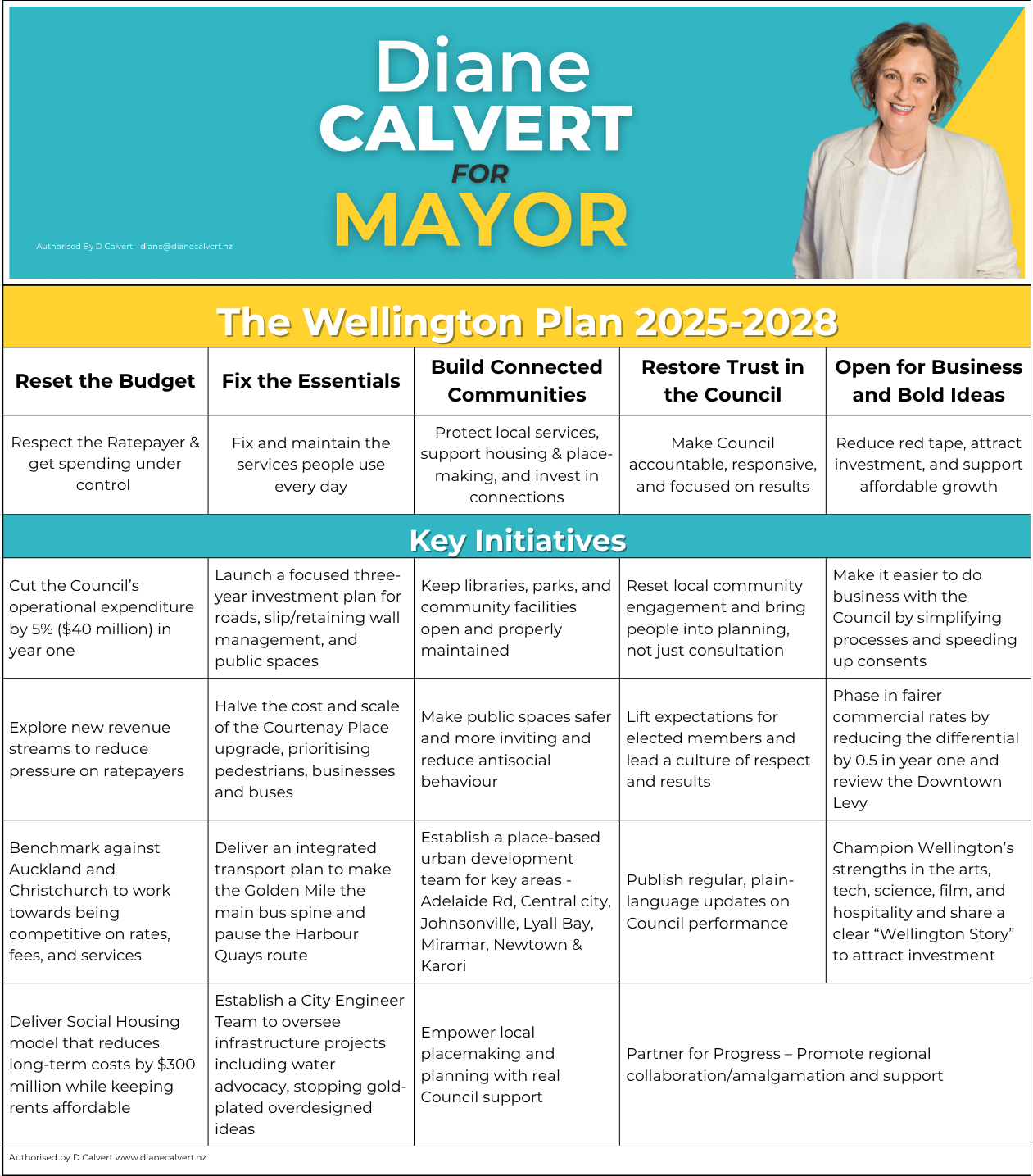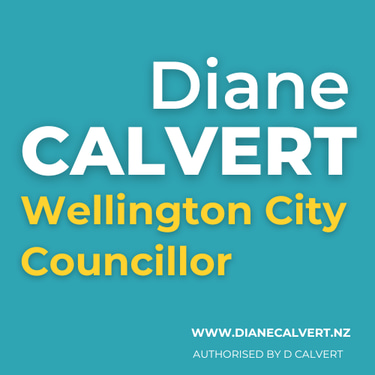This is the Plan developed for my 2025 Mayoral campaign.
As a returning Councillor I will be working with the elected Mayor (Andrew Little) and the new incoming council to help reshape the priorities for the city together with a new plan to take the city forward. There is close alignment with much of what is the plan below to that of the incoming Mayor and Council.
2025 Mayoral Campaign Plan
The Wellington Plan — a bold, practical roadmap to fix what’s broken, protect what matters, and grow a city that residents and businesses can be proud of.
This isn’t just a list of priorities. It’s a detailed, achievable plan based on what I hear every day from people across Wellington, the frustrations, the ideas, and the strong desire to see our city thrive again.
The plan is built around five priorities:
Reset the Budget
Fix the Essentials
Build Connected Communities
Restore Trust in the Council
Open for Business and Bold Ideas
I know where Council has gone wrong because I’ve held it to account - costly bike racks for over half a million, a $1.4 million bus stop, a corporate welfare deal in a proposed hanout to Readings Cinema, over inflated Golden Mile and Thorndon Quay proposals., lack of transparency in information, poor governance etc. I’ve pushed back on excessive spending, championed practical solutions, and stood with local communities when others looked the other way. Despite this, I have also been able to get wins for the city and local communities such as an upgrade to Khandallah Pool, new public toilets at Ian Galloway Park, advocacy to help reduce Victoria University School of Music cuts, contribution to the Circa theatre rebuild and getting fundamental changes to more transparency at the Council. I have also been a strong advocate for local communities in Ngaio, Wadestown and Karori around planned roading changes to ensure local voices were heard.
My plan for Wellington for the next three years works because it combines experience with realism. After nine years on Council, I know how the system works and how it gets stuck. I’ve built strong working relationships, seen where change is needed, and stayed focused on what matters most: roads, pipes, and reliable services.
The Wellington Plan


The Wellington Plan - in detail ...
1. Reset the Budget
Respect the ratepayer, prioritise spending, rein in costs, and redirect investment to what matters.
Direction
Make affordability of rates a leading principle, noting that 16% of Wellingtonians say they do not have enough money to meet everyday needs.
Focus budgets on essential services such as roads, waste, and community spaces while maximising every dollar.
Reduce the next year’s budget by 5% (comparable to government sector costs where 6-7% were targeted)
Provide Wellingtonians with choices on any proposed rate increases, offering 2–3 clear options with trade-offs explained.
Be competitive on our rates, fees and growth results with Auckland and Christchurch which are currently significantly lower.
Target the two biggest long-term cost drivers - social housing and water - which together are forecast to cost ratepayers over $1.5 billion over the next decade. These must be managed with a laser focus on value and partnerships
Work with Council and the Chief Executive to develop the 2026/27 Annual Plan in line with this new direction.
Align funding with the Government’s direction to refocus councils on core services while protecting local flexibility.
Spending Priorities
Cut the cost and scale of the Courtenay Place upgrade by 50% (saving approx. $25m), focusing on practical improvements to safety, access, and street vitality for people and businesses, while maintaining reliable bus access. Integrate the plan with optimizing the Golden Mile bus spine.
Reduce local emissions in a way that does not put extra strain on ratepayers acknowledging the strong progress already made in this area (lowest carbon emissions in Australasia)
Stop gold-plating projects like a $563,000 bike rack or moving a bus stop for $1.4 million when much lower cost options are possible.
Build and convert over renovate – Partner with private sector and Government to deliver more effective Social Housing at a costs tenants can afford and reduce a 10-year $1 billion burden on ratepayers.
Social Housing
Right now, Wellington City Council is planning to spend over $500,000 per unit upgrading its ageing social housing. That’s not just expensive — it’s inefficient. Weekly operating costs for the existing stock exceed $300 per unit, and gross rental yields sit around 3.5%. It’s a model that’s unsustainable for both tenants and ratepayers.
I propose a smarter, more flexible approach: review the upgrade programme and operating costs to save $300 million (a third of the current 10-year budget) and ensure that rents remain affordable while easing the burden on ratepayers.
Not every building requires a full-scale upgrade, in many cases, this would make rents unaffordable for the very people the housing is meant to support. Instead, I will work with the affordable housing sector and Government to deliver the upgrades through existing properties or new homes on surplus Crown land held by Kāinga Ora, or through central city office-to-residential conversions, where viable. Some existing Council housing sites that are no longer fit-for-purpose could be sold to help offset the cost of delivery.
The current surplus retained by the Council’s Community housing provider – Te Toi Mahana will be provided to Council to offset operating costs.
This approach will:
Deliver better homes, faster
Cost significantly less than full rebuilds or upgrades
Minimise tenant disruption allowing people to move once, into fit-for-purpose homes
Ease a projected $1 billion burden on future ratepayers
Social housing is a national responsibility. As Mayor, I will lead a renegotiation of the Housing Deed of Grant with Government to ensure this transition works for tenants and protects local ratepayers from further cost escalation. The deed expires on 2037, only some 12 years away, which warrants discussion now on the Council’s intended long-term commitment.
2. Fix the Essentials
Fix, maintain and upgrade core infrastructure — roads, water, waste, and public spaces.
Leadership
Get a clear 3-year plan to fix roads, footpaths, and public spaces so residents know what is coming and when.
Rebuild a City Engineering Team — Smarter Infrastructure, Better Oversight
City Engineering Team
Council has become too dependent on expensive external consultants, often resulting in over-engineered and delayed projects.
I will establish an in-house City Engineering team to provide independent, expert advice on new infrastructure projects, so we get more practical, efficient designs that actually suit Wellington.
The team will also provide technical oversight of the new Wellington Metro Water entity to ensure ratepayer-funded infrastructure is fit-for-purpose and responsibly managed. Separate water charges must not become a blank cheque and need to be kept in check by holding Metro Water accountable for results, focusing on leak prevention, prioritising critical upgrades, and maximising return on investment.
Transport
Integrate transport solutions to reduce congestion and improve access while respecting the needs of local residents and businesses.
Optimise the Golden Mile bus spine to save money as light rail option is now dead and integrate fully with the planned upgrade to Courtenay Place.
Postpone Harbour Quays route until more people are working in and around the central city – circa 10 years
Get the bus network moving more people efficiently into and out of the central city each day.
Bus lanes to operate in peak-time use only e.g. Adelaide Rd.
Water & Waste
Pause the planned inefficient organic collection service (up to $22 m for capital plus ongoing operational costs of approx. $7 million per annum) until there is an affordable regional proposal
Ensure Metro Water delivers real value for ratepayers by improving service reliability and controlling future cost increases. As water charges are forecast to nearly triple by 2034, strong oversight and smart investment choices are critical.
Environment
Tackle climate risks with practical, locally led solutions such as flood mitigation and slip remediation
Maintain our environmental practices such as management of waterways and open space noting that the city has the highest city-wide tree canopy cover (30.6%) in NZ
3. Build vibrant, connected communities
Protect local services, support better housing and place-making, and invest in connection.
Placemaking
Make public spaces more welcoming and better designed, supporting community use and reducing antisocial behaviour noting that 51% of Wellingtonians felt that Wellington has become a worse place to live in the past 12 months.
Prioritise housing development where infrastructure can cope with growth.
Introduce an Urban Growth Partner Programme to proactively support landowners and investors on major and emerging development opportunities —starting with areas like Adelaide Road, the Central City, and Johnsonville where existing plans already exist (since 2008) but need action and where other opportunities exist such as Karori, Newtown, Lyall Bay & Miramar.
Community Amenities
Keep libraries, parks, and recreation spaces well maintained and open to all.
Allocate an annual local grant (from existing grant funds) to ward councillors to be determined collectively per ward ($5 k per elected member)
4. Restore Trust in the Council
Lift performance, improve transparency, and lead a more united, effective Council.
Leadership
Set high standards for elected member conduct with less politics and more support, consensus and progress.
Support the Chief Executive in delivering faster, smarter Council services aligned to the reset of priorities
Communication
Replace box-ticking consultation with real conversations and listening as 48% of Wellingtonians do not have confidence in Council decision making
Be upfront about costs, risks, and timeframes of major decisions.
Publish regular, plain-language updates on Council performance with what is working, what is delayed, how we compare to other cities and what is being fixed.
Local partnerships
Give communities more say in their neighbourhood’s future.
Build stronger partnerships with iwi, other councils, and central government that serve Wellington’s long-term interests.
5. Open for Business and Bold Ideas
Reduce red tape, attract investment, and support affordable growth.
Planning & Delivery
Streamline consenting and approvals for housing and business developments.
Proactively support landowners and investors on major and emerging development opportunities including the Urban Growth Programme.
Make Council easier to deal with for both big investors and small businesses noting that a -1.6% decline in GDP in Wellington compared to a year early and higher than the national decline.
Harness the use of technology to make council processes more effective and productive.
Growth
Begin a phased adjustment of commercial rates (0.5 reduction in differential in first year) to be fair and workable (businesses pay 44% of the general rates) and review the Downtown Levy to ensure funding is directed to priority areas for businesses
Review the effectiveness of Wellington NZ and its subsidiary Creative HQ for value for money and effectiveness for the local economy
Support local events, arts, and creative industries that grow our economy and bring energy to the city noting that 6.77% of Wellingtonians work in the creative sector, the highest of any territorial council
Back Wellington’s strengths in tech, film, science, hospitality, and innovation.
Secure a strong future for Wellington Zoo as a regional asset for families, education, and tourism.
Regional Leadership
Work with iwi, other councils, central government, and private partners to unlock smart, sustainable growth
Develop a clear, authentic ‘Wellington Story” that reflects who we are and where we’re heading. This will be used to support the attraction of new residents, businesses and investment without relying on gimmicks or glossy branding.
Work with the other metro councils (Porirua, Hutt City, Upper Hutt) to amalgamate for better service.
